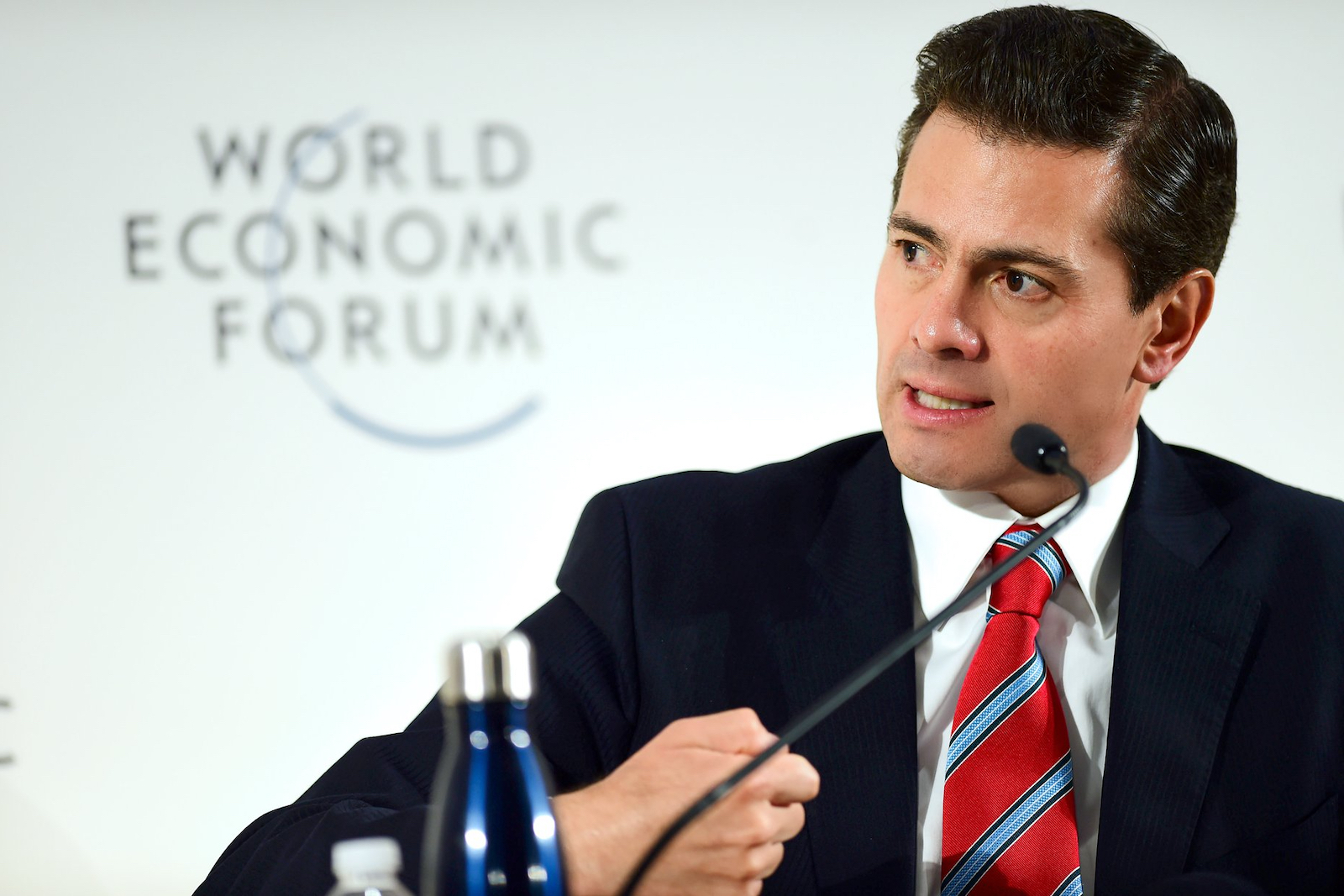
Enrique Peña Confronts Hard Realities
With the election of Enrique Peña Nieto late last year, Mexican voters demonstrated that their distrust of his Institutional Revolutionary Party (PRI) was overshadowed by their anxieties surrounding the pressing issues facing the country.
The PRI claims that its decades-long tenure during the 20th century means that it knows how to successfully run Mexico, and this time Mexican voters agreed by a substantial margin. Setting arguments regarding its record aside, the PRI holds only a plurality in both houses, and so it remains to be seen whether it can be consistent and effective in forming the coalitions necessary to pass meaningful legislation. In his first four months in office, Enrique Peña Nieto has quickly set the tone of his administration through a series of bold, attention-grabbing measures designed to build momentum and gain popularity.
Nieto’s progress in taking on telecoms and television monopolies and reforming Mexico’s abhorrent education system has been meaningful and real; it is paramount, however, to not mistake substance for style. Nieto is off to a good start, but if he is indeed serious about succeeding in his ambitions to raise Mexico’s annual growth rate to 6% and to nurture the country into a fully developed power, his battle for reform has only just begun.
Enrique Peña Nieto must first follow through with the progress he has made so far in targeting the country’s most notorious and perhaps damaging monopolies in the telecoms and television sectors. The lack of competition in telecoms alone costs the economy around $25 billion per year according to the OECD — a welfare loss equivalent to nearly 2% of GDP. The set of constitutional and legal reforms Nieto has put forward calls for the creation of a new regulatory agency with meaningful antitrust authority and the introduction of several mechanisms to bring competition to broadcasting. Nieto’s reforms, according to his finance minister, would ripple throughout the Mexican economy, resulting in a full percentage point increase in annual GDP growth.
The proposal itself is great on paper, enjoys fairly widespread support, and includes many of the OECD’s suggestions, but remains, as of today, only legislation. The bill was passed in the lower house in March and is set to face the Senate in the near future. There will be plenty of time in the weeks it will take to pass through the Senate and the months or years it will take to implement for it to be derailed by special interests or the old guard of the PRI.
Mexican regulators have a long history of bending under the pressure and manipulation of the industries under their jurisdiction. Enrique Peña Nieto cannot allow that to happen. Anticompetitive behavior serves as one of the most disruptive forces undermining Mexico’s economic progress. A positive indication of the PRI’s commitment is a legal reform signed by Enrique Peña Nieto on April 2nd that restricts the use of the so-called Amparo, a type of injunction that is intended to preserve the basic constitutional rights of Mexican citizens but is typically exploited by companies and special interests to block regulatory and legislative measures. Representatives of firms in several industries, including telecoms, will now be unable to file an injunction of this kind. While many tactics still exist, limiting the use of Amparo as a method of obstructionist recourse is a very meaningful and important first step.
The response from the monopolists themselves has been concerning. Though the proposal has caused the share price of his América Móvil to drop nearly 20% since its height in February, Carlos Slim has, contrary to logical expectation, been rather supportive. If it should pass the Senate as expected, Carlos Slim will still maintain a full 50% of his market share in telecoms, be able to deflect future accusations of unfairness, and, most importantly, gain long-sought access to the television market.
Likewise, Emilio Azcárraga has already partnered Televisa with the Slim rival Iusacell to potentially expand a stake in telecoms. Many worry that Mexico’s two most famous captains of industry will use the pending legislation to their advantage, and indeed the experience so far has given weight to the criticism that Enrique Peña Nieto’s reforms will do little but give oligarchs access to each other’s markets. Again, implementation and how the new regulatory authority flexes its muscles will be the key factors in preventing monopolistic industries from merely transitioning into oligarchies. Enrique Peña Nieto’s administration must prevent this as well.
The second issue Nieto must tackle is a robust reform of the energy sector that addresses the shortfalls of the state-owned energy behemoth, Petróleo Mexicanos. PEMEX has long been considered sacrosanct among policymakers, but, as the explosion at its headquarters in Mexico City in February tragically demonstrated, it has become rife with inefficiencies and poor reinvestment. Standing in the way of any corporate restructuring are deep-rooted problems that will be politically corrosive to solve. To start, its size alone makes it difficult to handle. It is one of the biggest corporations in Latin America and earns nearly $110 billion in annual revenue.
Additionally, its corporate structure is immensely complex. The four divisions that make up PEMEX were intended to provide transparency and clarity to each of its different exploration and production, refining, petrochemicals, and other activities. These divisions today operate as if they were separate entities – making any sort of communication, let alone coordination, a logistical nightmare. Only one of those divisions, exploration, and production, is consistently profitable. The others typically run in the red: the refining division, for instance, regularly posts losses of $2 billion a year. If that weren’t enough, PEMEX has a bloated workforce of roughly 150,000 workers, 120,000 of which are represented by one of the strongest unions in Latin America headed by Senator Carlos Romero Deschamps, an influential member of the PRI. As a consequence, PEMEX faces huge pension liabilities and crippling collective contracts for workers that are wildly unsustainable. The firm is unable to invest in infrastructure and R&D appropriately because so much of its profits are siphoned off to the state: fully one-third of the federal government’s tax revenues come from PEMEX.
Over time this poor investment has translated into a decrease in production to 2.6 million barrels per day (b/d) today from 3.4 million b/d in 2004. That does not derive from insufficient reserves, though: nearly half of its oil and gas reserves are located in deep-water fields, yet it lacks the technical expertise to tap these resources due to a continual shortage of the wherewithal to develop the technology. Mexico has the potential to be an energy superpower, but because of the failures of PEMEX, it is a net importer of oil and natural gas mostly from the United States.
Enrique Peña Nieto has stated on many occasions his ambitions to transform and modernize PEMEX by attracting private capital from home and abroad, calling for an overhaul of the firm “indispensable to free up Mexico’s great economic potential.” Unfortunately, Nieto has taken privatization of PEMEX off of the table in recent weeks. In due fairness, the full privatization of the company is widely considered a radical move, and even more, modest reforms are likely to provoke a great deal of opposition from both the political left and elements of the PRI. However difficult or unlikely it is to pass, though, privatizing PEMEX is a noble cause and must be pursued to some degree. The least ambitious step would be to allow it some level of autonomy that might be compared to a central bank. This type of action would be little more than a step in the right direction.
A more ambitious approach would be to allow PEMEX the freedom to enter into partnerships with private firms much like Saudi Aramco. This option would allow PEMEX to acquire the expertise it needs to tap the vast reserves currently out of its reach. A positive sign is an announcement this week by CEO Emilio Lozoya that PEMEX is in negotiations with its employees to reform what he called “one of the most anarchic pension systems in the world.”
Emilio Lozoya’s close relationship with the president means that reorganization of this sort is likely intended to set the foundation for a larger overhaul later this year. The issue is even more complex than it seems, though, as any reform of PEMEX will require a fiscal deal as well. As the government weans itself off of oil revenues it will need to enact a series of tax increases to make up for the huge hole on its balance sheet that might take the form of a value added tax on essential goods like food and medicine. Taxation of this sort will face daunting opposition.
The last issue Enrique Peña Nieto must grapple with is the one he has been peculiarly hesitant to address: forming a coherent strategy to confront crime and violence. The priorities he has set indicate that, unlike his predecessor Felipe Calderón, he is determined to keep his tenure from being defined by the drug war. Though he has promised to halve the drug-related murder rate, he seldom mentions the daily violence plaguing many parts of the country. The reduction in investigations for “crimes against health” — of which a vast majority are related to drug trafficking — coupled with his rhetoric suggests he may be scaling back the war on drugs.
While few are calling for a return to the “narco-pact” of the two decades before the drug war that left drug cartels largely to their own devices in exchange for keeping violence low, it seems that after 6 years, billions of dollars, 70,000 dead, 30,000 disappeared, and the emergence of commonplace kidnapping and extortion, the Peña Nieto administration is parting, albeit quietly, with the hardline tactics of the previous administration. His long-term strategy is to lower crime through healthy economic growth. The few short-term initiatives in the works focus on consolidating local police forces into their state counterparts and the potential creation of a national gendarmerie. The government needs to shift its focus from efforts to kill and capture cartel leadership to strengthening Mexico’s fundamental institutions like the court system and police force. Fortunately, the policy appears to be moving in this direction.
What this might mean for the relationship between Enrique Peña Nieto and his neighbor to the north is unclear. Washington is well known as a staunch proponent of supply-side interventions and vehemently supported the efforts of Felipe Calderón. If the United States senses that capitulation has taken the place of heavy-handed attempts to fight the drug cartels, relations between Mexico and its largest trading partner might sour.
For the breakneck speed the Peña administration has taken for reform it must also thank the opposition, which deserves a great deal of credit for coming to the table. The “Pact for Mexico” signed between the PRI and the two main opposition parties created the coalition needed for rapid legislative changes, but the communal outrage over the control de facto powers have wrested over the government is only temporary, and the brittle coalition will inevitably fall apart. This is likely to happen in July when 14 of Mexico’s 31 states have local elections and Baja California has its gubernatorial race.
If Mexican voters turn out in even stronger numbers to support the PRI, the opposition might embrace a more obstructionist approach. This would spell potential disaster for the idealistic Enrique Peña Nieto and his ambitious timetable for reforms. In any case, if Enrique Peña Nieto is able to make headway on any of these three issues he will have had a great year; significant progress on all three would be exceptional.

